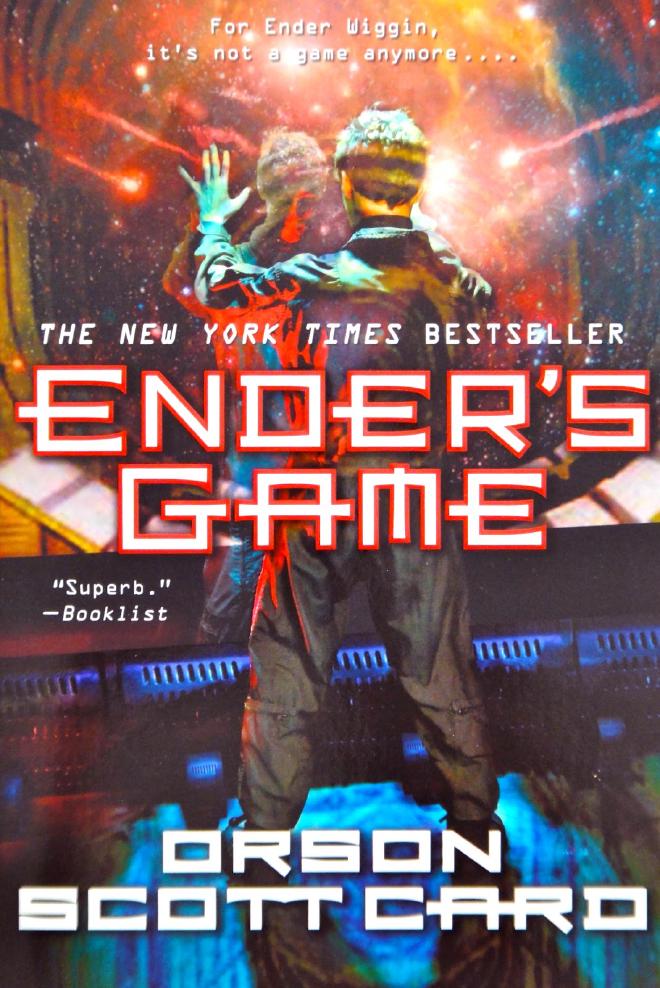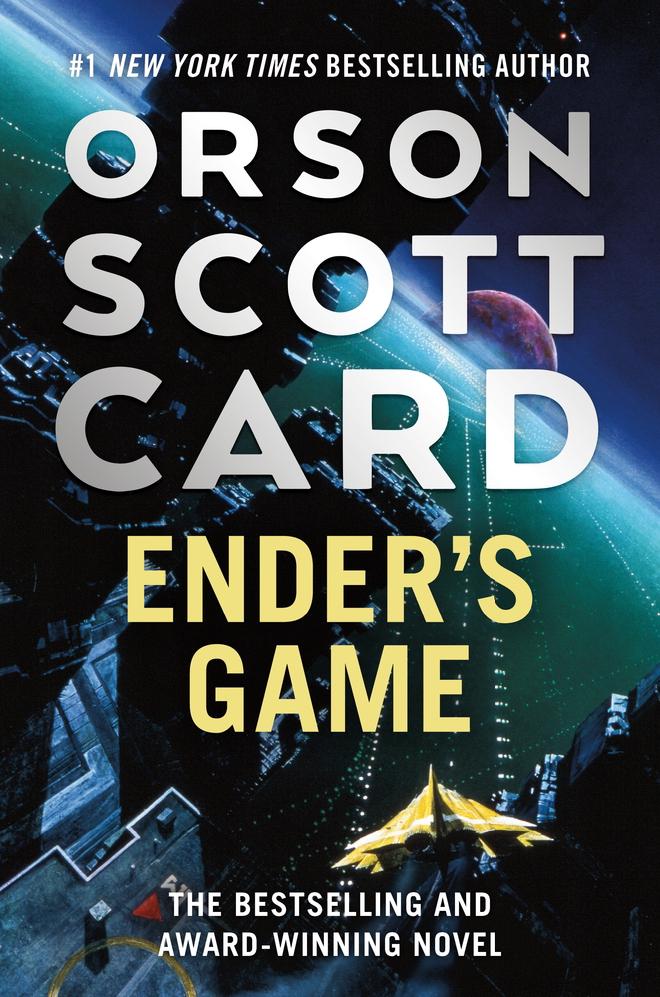Intro #
This is technically the 3rd time I read this book. I read it once before college, once in college, and now after college. One thing I noticed was that the book was updated, or modernized, by the author himself; the vocabulary between the early publications and the recent ones has been altered. You can read more about it on this page.
Find it here #


Favorite Quotes #
The quotes below are sourced from:
- the author’s own “Introduction” on the later publications
- the story itself
- and one from the movie that isn’t in the book
Some quotes have no explanation. Their meaning is something I explore but not in a way that is shareable here.
The quote from the movie is perfect. Cinema has a great way of improving the retelling of a story, even if it has to omit a lot.
Because never in my entire childhood did I feel like a child. I felt like a person all along―the same person that I am today. - Orson Scott Card
It’s surprising to read the author say this. It’s even more interesting that he received letters from students saying that they identified with being Ender.
I too have always felt the same as both the author and the children that wrote him. I have always felt like the person I am today, the only difference being that I have lived more than my younger self and that I have seen more. Am I smarter than my younger self? No.
I have always been me. I will never not be me.
The only reason you don’t think gifted children talk this way is because they know better than to talk this way in front of you.
The author received feedback from adult readers that believe gifted children do not speak or act as the ones portrayed in the book. I agree with the author. Children no better than to speak a certain way around adults, and so adults fool themselves into thinking they are just “acting like children.” No, they are acting in a way that is palatable to adults. Otherwise, there are consequences.
Sometimes lies were more dependable than the truth.
Yes. It’s strange to agree with this. The main character is being lied to by an adult in order to spare him from the truth. Like the statement says, some lies point to the truth more quickly and accurately and we can rely on the truth of it based on how naturally the other has lied to us. Children that learn to lie early can see the lies in others and can begin to see that we’re all trying to cover something up. The facade is just as useful as the most honest of fronts.
Nobody gets hurt, but winning and losing matter.
I would guess this is inherent knowledge built into the human experience. It is built into our DNA, our brains, while we are still in womb…and likely even before conception. Why?
In the beginning, all the losers died. To live is to win, to lose is to die; that is the simplest version of it all. We dress it up as games and refer to them as “just play”, but they aren’t just games.
Children know this without having the words.
He toyed with the idea of trying to be like the other boys. But he couldn’t think of any jokes, and none of theirs seemed funny.
I laughed at this one. I had the some thoughts as a boy.
“Should I try to me more like them? If so, how would I even start?”
In the end, my nature did not allow it.
“I told you. His isolation can’t be broken. He can never come to believe that anybody will ever help him out, ever. If he once thinks there’s an easy way out, he’s wrecked.” “You’re right. That would be terrible, if he believed he had a friend.”
The main character is a child, a very young gifted child. He is isolated to believe that the only person he can truly rely upon is himself.
Treating a child this way might be considered bad parenting. In today’s world this would be rephrased, repackaged, to make it more acceptable to hear.
“We must teach our children to be self-reliant. They must understand they have their own autonomy.”
Maybe that is more acceptable to the world as a philosophy for child rearing.
Indeed the methods of the book do sound harsh, but I can understand, given the circumstances of the fictional world they’re in, why more drastic wording would be used.
He could not cry. There was no chance that he would be treated with compassion.
I still don’t know exactly what to say about this one. I have to reflect and determine how early this…lesson was taught to me.
“Does it ever seem to you that these boys aren’t children? I look at what they do, the way they talk, and they don’t seem like little kids.”
“Maybe you can be a commander and not be crazy. Maybe knowing about craziness means you don’t have to fall for it.”
[He] realized that in their laughter, in their friendship, it had not occurred to them that he could have been included.
This happens to me even now. Maybe I’ve just never been the “in-crowd” type of person. Always swimming to where no one else deems worth going.
Picking on some poor little kid so the others’ll have somebody they all hate. Sickening. Everything I hated in a commander, and I’m doing it. Is it some law of human nature that you inevitably become whatever your first commander was?
This part is strangely familiar to me. It reminds me so much of this one:
One always ends up becoming like our enemies.
This second quote comes from the The Book of Sand. I wonder if Orson Scott Card read it or not since it did come before his own book.
I find it peculiar that the same notion, that we become like those we despise, or that which we despise, has been observed by multiple people, including myself. Maybe it’s that the enemy holds such a grip on us that the only way to shake them off is to resort to their own methods.
“…[He] must believe that no matter what happens, no adult will ever, ever step in to help him in any way. He must believe, to the core of his soul, that he can only do what he and the other children work out for themselves. If he does not believe that, then he will never reach the peak of his abilities.”
This is similar to the quote above. This is reiterated more than once as the main character is trained and developed. It makes me wonder about how many of us adults there are out here in the world that are unaware of how much their actions have shaped their lives and how much could change if they chose different actions, behaviors, customs, or ways of dress.
The ability to fully, 100%, shape the world to your will is typically only attributed to the singular God. Once he is split up into multiple gods as some cultures do, the full ability is lost. Each god retains some power to shape the world but only within a limited domain.
So it’s natural, as a human, to feel as if the world and those in it, are working against you and your ideal version of things. I’m learning that for the fortunate, the lesson is taught to them in a nice way and it can be put into practice early. For the unfortunate, it might never be learned at all; but if it is, it’s taught through more pain and suffering than is usually necessary.
Ender was smiling.
“I beat you again, sir,” he said.
“Nonsense, Ender,” Anderson said softly.
“Your battle was with Griffin and Tiger [army].”
“How stupid do you think I am?” said Ender.
If gifted children spoke their mind around adults, this is how they might do it. I don’t think most adults would enjoy this.
“I didn’t fight with honor,” Ender added.
“I fought to win.”
That is a tough choice to make. Honor is nice, but living is better.
“In the moment when I truly understand my enemy, understand him well enough to defeat him, then in that very moment I also love him. I think it’s impossible to really understand somebody, what they want, what they believe, and not love them the way they love themselves. And then, in that very moment when I love them —”
“You beat them " For a moment she was not afraid of his understanding.
“No, you don’t understand. I destroy them. I make it impossible for them to ever hurt me again. I grind them and grind them until they don’t exist.”
“The curse of the Wiggin children.” She joked, but it frightened her, that Ender might understand her as completely as he did his enemies. Peter always understood her, or at least thought he did, but he was such a moral sinkhole that she never had to feel embarrassed when he guessed even her worst thoughts. But Ender—she did not want him to understand her.
“I didn’t want to see you.”
“They told me.”
“I was afraid that I’d still love you.”
“I hoped that you would.”
“My fear, your wish—both granted.”
Ah! This was…worded so well, but the essence of it seems so tragic because it’s a scene between brother and sister who were once close but grew apart.
What a strange way to say I love you.
The way we win matters.
This is from the move and I include it here. It is said near the end of the movie.
How very true it is.
Humanity does not ask us to be happy. It merely asks us to be brilliant on its behalf. Survival first, then happiness as we can manage it.
When put this way, I feel rather grateful for all my problems. I’m not fighting for survival. I’m only fighting for whatever it is I think happiness is.
He was concerned, not about getting credit, but about getting the job done.
This was great to see in this book. It reminds me of a podcast where the person being interviewed said “I figured out I can get away with doing mostly anything so long as I don’t care if I get the credit or not.”
The humans did not forgive us, she thought.
We will surely die.
This is a climactic thought that an alien race has when they realize that they have failed to communicate with us humans because our ways of communicating are naturally incompatible with theirs.
What does one do when whoever they are talking to is speaking the same language but has a view of the world where their up is not my up, where their down is not my down?
Destroy them or learn to translate.
Destroy in the above statement I’m making means to banish them from your life, not to kill them. In the book, however, ‘destroy’ meant kill.
We are like you; the thought pressed into his mind.
We did not mean to murder, and when we understood, we never came again.
Here are our failures, and here is our greatness;
we did not mean to hurt you, and we forgive you for our death.
The link between this statement and the Christian Jesus is remarkable. Aside from that, I cannot think of a forgiveness given for something greater than one’s own death. To be killed by another that knows us already is maybe the highest level of betrayal. To forgive them is maybe the most heavenly act.
Speaker For The Dead
“We have to go. I’m almost happy here.”
“So stay.”
“I’ve lived too long with pain. I won’t know who I am without it.”
This calls back to the book on trauma, The Body Keeps the Score. It’s very curious that the character is aware enough to know, and see ahead of time, that the pain he has carried will have no more place in the world he himself helped create and make safe. What a choice to make, to go off and search for a place where the pain can still blossom because it is, in a way, the soil that his being flowered in.
